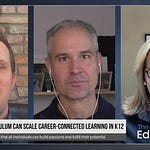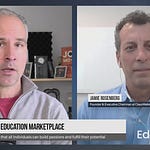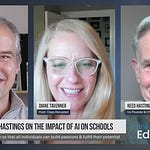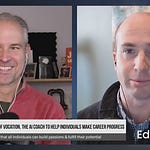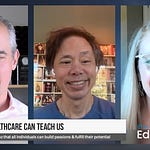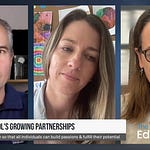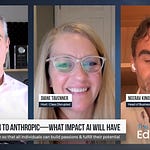As Clay Christensen always said, despite its reputation, a good theory is a very practical tool. It helps you to decide what steps will lead to what results in a given circumstance. It's not “theoretical.” In this conversation with Outschool.org's Kris Comeforo, we break down how he used innovation theories to guide a program that Outschool.org put in place to serve homeschool students in Detroit—which it’s now expanding elsewhere. Kris told me about how he used the theory of interdependence and modularity, the Jobs to Be Done theory, and some of the other points from my book, From Reopen to Reinvent, to drive his actions. I enjoyed geeking out with Kris and learning about how they engaged homeschool students in the city of Detroit to make a real impact. It was gratifying to hear how the work is now expanding through the use of theory along with the spread of education savings accounts and micro-grant programs in at least 14 states at the time of this recording. As always, subscribers can listen to the conversation, watch it below, or read the transcript.
Michael Horn:
Welcome to the Future of Education, where we are dedicated to building a world in which all individuals can fulfill their human potential and build their passions and and to help us do that, in today's conversation, we're welcoming Kris Comeforo, who is the Director of Product and Programs at Outschool.org and a recent graduate of Harvard University's EdLD program, which is a program focused on education, leadership. And so, Kris, it's great to see you. I'm excited to talk about the research that you did as part of that program and then some of what you're doing at Outschool.org that we'll get into in just a moment. But first, welcome.
Kris Comeforo:
Thank you. So, Michael, really, really excited to be here and have this conversation with you.
Michael Horn:
Yeah, you bet. So I'll give folks a little bit of a background of why I was so excited to have this conversation. You reached out some months ago because you were starting to work without school and an organization in Detroit which I'll let you share more about in just a moment. But a lot of the theories that my research is based on in terms of helping organizations innovate became not so theoretical. You were really using them on the ground. And I said we just ought to geek out about this and learn about what you learned in the process. So why don't you set the scene for us first? Because I've read this capstone project that you did about this work in Detroit, but set the scene for folks. Who were you working with? What was the objective? What were you and Outschool.org trying to learn?
Kris Comeforo:
Yeah, absolutely. And I'll first explain the distinction between Outschool and Outschool.org because I know that raises some questions with folks. But Outschool is an education platform with live online instruction. I think over 140,000 active classes on there, they've reached over a million learners in nearly 200 countries. Really great platform. And on March 2020, Outschool realized that a lot of families that could benefit from live online instruction might not be able to afford it. So they established Outschool.org very early on into the pandemic with the mission of making sure learners that experience racial or economic marginalization have access to a suite of services so that they can love learning. So that's how Outschool.org really got started. And in the beginning, Outschool org's thesis was providing access to Outschool classes. And that's what the organization did through what I kind of consider like the emergency relief part of the pandemic, when really no schools were open and educational opportunities were limited. But as Outschool.org started to rethink what its strategy was going to be, as schools started to reopen and things and the landscape started to change a little bit. And that's about when I entered Outschool.org through a year long residency with that EdLD program that you described earlier. So I was going to be spending ten months with this organization trying to think, like, how are they best positioned with the resources that they have and the access that they have to the relationship without school to serve communities and what they really need. And where I focused my work around was this organization, Engage Detroit, which is a group of homeschool families in Detroit, Michigan, started by Bernita Bradley, who is a complete tour de force in education and community organizing. And it was a pleasure to work alongside of her and her community. But we really asked that question of what do you need and how can we best support? And they too, were an emerging organization. Bernita herself wasn't a homeschool parent. She spent a lot of time supporting public schools and public school initiatives. But during the pandemic, she and a lot of her neighbors and friends turned to homeschooling to really support their children's education. So spent a year developing our newest program Outbridge with Engage Detroit.
Michael Horn:
Perfect. Now that's super helpful background, and obviously I'll just make a few footnotes for folks that are tuning in, Outschool the parent, if you will, for-profit in this case. Obviously, I think a lot of folks became familiar with them, if they weren't already during the Pandemic signing up for enrichment classes. I know my kids took several classes on Outschool during the Pandemic, and it’s still part of their imaginary play because they remember it well. So you have that. You have Outschool.org then trying to figure out how do we leverage what we can bring to bear for these communities. Bernita, I will say her work in Detroit, she really is a tour de force. She was the one on a panel at GSV who put me in my own place. I sort of said, how do these parents that don't have backgrounds in education and maybe a lot of wealth in many cases because she's really working with marginalized families who don't have a lot of resources in many cases. I sort of said, how can they possibly navigate this world of homeschooling and make sure their kids are getting the resources that they need to bear? And I know we're going to get into this, but I'll never forget her line, which was, Michael, 16% of Detroit students can read proficiently. You better believe we can do better than that. And so that's sort of where your story kicks off, because you start to work with her and you start to think through and you have this theory of action as you describe it. What are the resources and sets of information that we need to help this community of parents really unlocking the promise of homeschooling and specific the customization to their kids needs that they desire? So tell us a little bit more about that theory of action and then we'll get into some of the theory driven parts of that on the innovation side.
Kris Comeforo:
Yeah, absolutely. And I think I just want to underline the point that you raised with Bernita. She really looks at this through an asset based lens of our children are brilliant, and learning happens everywhere all the time, and we can support them to be the best. And so many of members in her community just felt like they weren't getting the support they needed through the public schools at the time, during the pandemic. And they knew and really believed in their hearts that their children could be achieving at much higher levels, which is really what gave birth. And she'll be quick to remind anybody right, of the origin of that. So not surprised at all that that's how she framed it to you as well. When we were developing theory of action, it was deeply understanding the context and talking to families was such a key role. And we also talked to a lot of families from our emergency relief program that we were handing out Outschool dollars to. And we not only talked to families that were spending it and gave us good stories, we also talked to families that weren't spending it and say, like, wow, we gave you a lot of access to these great enriching online classes. How come you didn't use all of the funds that you were granted? And the results were interesting, but also not surprising. We heard things like, thanks for this suite of online classes, but we only have one computer and there's three kids in the house. We can't manage getting everybody all online at once. Or thanks for these online classes, but my child's been shuddered at home for the last two years. They want to get out into the community and learn in person with their peers. Is there anything else they could offer? And then what I think is the most, I think, insightful one was a parent told me, my child wants to learn how to swim. You can't learn how to swim online. And that, to me, really just unlocked how we were thinking about this. How could we be positioned? Sure, we have this huge library and access to great online courses, but how do we connect families to a whole ecosystem of supports that are around them so that they could tap into local places in Detroit where you can learn how to swim, or you can learn how to play the violin or learn how to cook or get a math tutor in person, if that's what you have decided that your child needs the most right now. So not just limiting it to the resources that we had on Outschool, but a whole wide ecosystem of supports both online, but also in their community. And the way we really started to do it. And I don't know if you want to get into theory yet, but was just listening. And really what I wanted to know after taking these courses that I know you're so interested in is why are you hiring homeschooling to do the job of education? I'm a lifelong educator and public schools teacher, assistant principal, principal. My mom and dad were both public school teachers. It's hard. Teaching is a difficult endeavor. So now choosing to homeschool and you're a working parent. Now you have to manage your job, you have to manage the duties of being a parent. And now you're also going to take on this massive responsibility of homeschooling and not only decide to do it, but families in engaged Detroit have persisted through the organization still growing. Started out with, I think, twelve students, and now there's over 200 families that are part of this network of families homeschooling in Detroit. They're sticking with it. And so my question is, why did you hire homeschooling? Why is that the solution? And what's the job that you're trying to get done with homeschooling? So it started there.
Michael Horn:
Yeah, let's stay on that for a moment because that's the jobs to be done theory, of course. And you spent a lot of time trying to understand, as you said, a, why they hired homeschooling, which is an interesting question, but also to your point, and I'm going to accelerate your story a little bit after you realized that, gee, the bundle of online courses, maybe that's not all that these families needed. They needed a much wider range of things. You started to give them cards, basically prepaid cards with dollars loaded on them that they could spend on a variety of activities from different buckets ultimately. And you evolved to that, of course, but not all the families used those cards and used the dollars. There's like several hundred dollars on these cards that they could use, and some of them didn't even use them. And so if I recall, you're doing interviewing both to understand why they're hiring home school and really listen to drive the theory of action. But then also why do some families not use these cards? Like, why are they firing, if you will, a solution that is ready made for them? What did you learn through that process and how did it adjust your program over time?
Kris Comeforo:
Yeah, no, for sure, I think that's something that's been the most fascinating to study. And I think I was a little too optimistic. I really thought. I was like, wow, everyone's going to spend the money this week. I know it. And that didn't happen. Every family got $500 per learner. So if you had a family with three learners, $1,500, like you said, loaded on into a debit card that could only be used for educational purposes. Now, some families emerge really fast. I call them the super users. They had a plan. They knew exactly. Like, there's a Stem camp down the street on the weekends. There's a summer camp through the YMCA. There's online classes and assessments we want to sign up for. And it was fast. In talking to some of the slow adopters or who were kind of non consumers at first, there was a lot of things at play. Some of it was information overload. It's like there's so much out there. If you go online and I help my family, my brother and sister, I help lead my niece and nephew through, like, what do we do for math over the summer? If you just type that into Google, there's so many things that come up. And as a very experienced educator, I know how to sift through that information. But it's not always clear to families what's high quality and what's going to be worth it and what's actually going to move, whatever the results that you're trying to drive towards. So information overload was definitely some of it. Also there's some semblance of kind of like a scarcity mindset of, hey, $500 sounds like a lot per kid, but actually that goes really quickly and I have to make the right decision with this because it's not going to come back. We funded this through philanthropic donations. This is a one time scholarship. It's not something that families are going to have access to over and over again. So families really wanted to make the right decision as they were trying to go through this.
Michael Horn:
Super interesting. So then you talk about the set of services that you hypothesize that they need. And you take some pages literally from my book from reopen to reinvent, and you basically say, hey, if we imagine that they need access to everything from content knowledge to skills to you call it something different in your paper, habits of success, I think. Social emotional supports or something like that. And then real world experiences and the like. You have this sort of diagram that you build around it and then you have this really interesting sort of interaction that you say, if we hypothesize these are the sets of things that homeschooling families are going to want to connect into a we know from the jobs to be done. A major driver of this is going to be the social activity, the opportunity to socialize with other families and be part of a community still. So it's not just functional learning that they're looking for B, that the way they integrate across these different modalities or things that they're searching for, if you will, is going to be trickier in some cases than others because of this extreme modularity. Maybe I'll let you actually explain the theory and explain it how it manifested here. And then this is the part that I really want to geek out a little bit on about how it informed your design because I think there's a big jump from School provides everything, which is the fully integrated interdependent offering to homeschooling. It's completely unbundled. We get to choose from an array of providers and there's a continuum, it seems, in between.
Kris Comeforo:
Yes, no, and that's exactly how I thought about it and was definitely informed by your work from Reopen to Reinvent and try to like, how do I conceptualize this and bring it to action because you're exactly right. If you go enroll in a public school and just sign the paper and enroll, you walk in the building. You have a teacher that's certified by the state. You have a curriculum that's purchased by the district. If you need to go to the nurse, she's down the hall. If you want to sign up for the band, they'll give you a flute, they have a music teacher, and they'll even drive you to marching band competitions. Right? All of that just by that one instance of enrolling in school. Everything is really tightly put together, whereas homeschooling, families, it's a completely different architecture of school. Every single piece of this is put together piece by piece by piece. And this is very liberating and can be very customized, but also at times it can be really overwhelming in terms of how do we choose exactly what's right for my child right now and how does this connect? And I think that's something worthy of talking about to all of the different things. So because it was such a wide ocean, I needed a way to kind of segment it into different domains. So that's why I picked on the basic needs, the foundational skills, building social capital with real world experiences. Those were the different ways that I started to segment. Like, oh, I see people are spending on what I would consider a health and wellness activity. Or this is an activity that's going to support their foundational needs as a way for me to kind of visualize the behavior and the patterns that were starting to emerge as they started to spend in different ways.
Michael Horn:
Yeah, so let's stay with that now because on the one hand and theory of interdependence and modularity for those that don't know, essentially says most industries start as very integrated, fully proprietary, full bundle of offering. And the reason is that the way those parts in a system interact are not well understood. They're unpredictably. Interdependent change to one, oh my gosh, it changes these three things. I never thought about that before. And then when I change those things, that changes the thing that I just changed in the beginning. Right? And it sort of cascades. And so managing a schedule in a school, managing how band interacts with PE, how it interacts with your English language arts class, how it interacts with staffing. And so you end up with this full bundle of a model. On the other side of it, as industries evolve, they tend to go toward more modular offerings because they allow for customization. So once you satisfy the basic reliability and we start to understand how these parts connect to each other, we say, actually, it's okay if you want to go to this provider for your music, your private piano lesson, whatever it is, you want to go over here for this part, and so forth. And that's how real customization and choice come together. But what's interesting is that typically there's this continuum where we need to sort of be in the middle for customers as they're dancing between sort of different poles on this. And I guess that's what I was wondering as you reflected on this. It struck me that some families were totally capable of doing the fully unbundled, fully modular. They would take your prepaid card and just start picking different providers and others. Maybe wanted some of those components you just named to maybe be a little bit more interdependently linked and not arm's length providers. Because, gosh, you mean I've got to figure out the science camp and that's different from where they learn math, and you're telling me then I got to pick a reading provider also? That's a lot of things that unbundles a lot of choices all of a sudden. I guess I'm wondering did you find that that families fell in different places? And if so, what do you do to change that continuum? What does the theory tell you to do differently as you're designing it or how you're offering these options?
Kris Comeforo:
Yeah, definitely saw that wide spectrum of how people wanted to go and we got to remind ourselves, right, like school has this deeply ingrained mental model in our society that you go into this building, you can only learn chemistry if you sit in this seat for 180 days for this amount of time. And I think more and more and I think what innovative educators are getting excited about is people are more open to challenging that thought right now, which is exciting. But at the same time not everybody is ready to dive full on into that and taking a step back. A lot of different research with unbundled learning will say access is really important. This is expensive. People need assistance with funds and there's a number of different ways we can talk about that later. How different states and jurisdictions are helping with that information is also key though. Families need to know exactly what their suite of options are, how they can connect them and how it all fits together. But what we uncovered is an additional key component is community, is families needed to talk to each other and we could facilitate that. And there was some role for me to play as like, hey, listen, I've studied education for a long time. I used to be a principal. I know this is a really good math program. You can trust it. That was helpful information for families. But what would really spur a change in behavior is when one family would say that same thing to another family. Not me who had before this year had never been to Detroit, Michigan. But instead when I get families telling stories about how their kid is doing as a result of this program and what started to become interesting and this is indicative across the country, not in just Engage Detroit, some families started to integrate their services with other families, forming little micro schools with each other and saying, like, all right, listen, you seem to have this science thing figured out. Can my kid come with you and do those things? And then we'll go over here, I'll take them on the field trip to do this other experience. And families started to connect with each other to where they saw what worked. But it's still modular in the fact that you don't have to join that thing and subscribe to it. But families started to build it in a way that made sense for them, which I think is an important component of it.
Michael Horn:
Yeah, so I want to stay on that because that's actually really interesting. So is the point of integration you found less between, say, micro school and the real world internship, maybe at a lab or something like that or whatever it is, and more like you integrated community in the designs so that they could better pick and navigate among the choices. Is that, like what the point of integration was? More than the different parts of the wheel, if you will, to each other?
Kris Comeforo:
That's how I saw it, because that was the one thing we all had in common in this space. And that was that families and engaged mature. We're all in the same physical area and we have each other to support each other. But kids were all different. We had kids K through twelve and there wasn't enough kids to design a really great pathway to an internship that made sense for everybody. But the one commonality we had was we all have this community to work together, and we would bring them together for community events every single month. And we'd do things, we'd do activities and talk about making plans. We'd share different ideas. We'd let families talk to each other about different ideas that they had. And what was fascinating in the spending habits is whenever we had a community event, spending the next week doubled the average. Like there were spikes and this happened four community meetings in a row. We've since expanded this program to another community in Grand Rapids. And an interesting thing here is in Grand Rapids, all the families involved in the program are enrolled in traditional brick and mortar schools. Same thing is happening every time we bring families together and talk about these things, spending and engagement goes up. So I do think there is an interface with community that that's how we can kind of connect this thing together in a more interdependent way, even though the pieces of the puzzle may be different.
Michael Horn:
Super interesting, because the example we always use is IBM was the fully integrated interdependent initial computer, and then Dell, on the other hand, is the personal computer. They specified the standards, but, you know, have your seagate memory, your drive from this guy, the monitor here, et cetera, et cetera. Right? Your version of Microsoft Windows that you select and it all snapped like Dell would snap it together. It sounds like you're saying to build that modular design you have to have the community like that's the interdependent part and then you can really allow them to farm off to different options. What I guess I'm also hearing is that relates to the insight you got from the jobs to be done work, which was that maybe for whatever reasons that they're hiring home school to do it well, they needed a social component of that. They were not firing the social component of traditional schools. That was a hiring criteria and whatever they did next. And so that actually is a common linkage through the two frames, if you will.
Kris Comeforo:
Yeah, absolutely. And I didn't even connect it that way when I first thought about it. But you're exactly right and that social component to the job. I think there's a misconception that educators, myself and just the populace at large think that homeschooling is this, I'm just going to sit in the corner alone and do this thing. And actually when you talk to families, they're very connected with other families and kids are very connected with other kids in ways that I didn't anticipate. And I think you're right that that social component drives through to the interdependence that kind of holds this thing together. And it fits with what our thesis has been as we support different communities through these direct to family funding structures. Whether we're providing scholarships or whether states are providing micro grants or ESAs, is that we can't just show up into a state and say, hey, let us help. Going through existing communities is where we found to have the biggest impact because that social component is so key and families really education is a deeply fundamentally personal endeavor and families want to do it in community with others.
Michael Horn:
So let's finish up there as we have this conversation, which is like the work now going forward. You brought it up that there's education savings accounts, there's micro grant programs increasingly in states, all these different ways that are not really a voucher, because a voucher is like, hey, you can go to a different school, but that's it. These are really accounts like they're dollars that you can spend on a variety of activities and you were starting to see a lot of uptake in those communities. How has theory enabled you to set up quickly and start to expand in these different places and sort of what's the vision for where Outschool.org goes from?
Kris Comeforo:
Absolutely, it's it's and speaking about theory, right, I know ESAs microgrants can be a politically charged issue, but if you look at where the puck is going, I think ESAs are live in 14 states, microgrants and other programs so popular and it's coming. And what I think we're trying to be really mindful of is as a mission-oriented organization is how do we make sure that families that we care the most about that historically have been the furthest away from opportunity, have access to take advantage of these programs in the most impactful way, whatever it is to them. And I see from afar, states are making some predictable mistakes that we made along the way. If you just say, hey, sign up here if you want some money, a lot of people will sign up. But data comes out from states. A lot of people also just don't spend if you just handing out the funds isn't enough. And we also know too, I know there's been numbers thrown out and a large number of families that start to take up the ESA dollars were families that were already enrolled in private schools and just funnel that towards their tuition. But like you said, there's more to it than that, especially with these micro grants. I think Virginia, Kansas has an interesting program as well where families in public schools are eligible for additional dollars for supplemental enrichment and tutoring and different things of that nature. So we see again. All right, states are providing access. I think that's great and can be really impactful for a lot of families, but there really needs to be a place for information, but also mostly community. And I think bringing people together and letting them have a supportive network of peers to think through, how do they get the most out of these additional resources is a problem that we're really interested to solve moving forward.
Michael Horn:
I think you've done it in a perfect place. So it sounds like the big task to do is to integrate forward, not just provide resources, but to integrate into the next steps of information and community. And then we'll actually see uptake and equitable access perhaps to these resources that are in these communities that people can avail themselves of. How many states do you guys expect to be operating in over the next couple of years and sort of helping facilitate these communities?
Kris Comeforo:
Yeah, I mean, I don't have the answer to that question so directly, but we are talking to different states and communities again, though I recognize the states that they're happening in, but it's specific communities that we know that we want to help serve throughout. So we're actually in the middle right now of running an RFP for new community partners for next school year, where we're going to be accepting a number of existing community partners in different places. And if you happen to be in a state that has access, we feel like we're well positioned to help your community get the most out of this experience. So this past year we had ten community partners. I believe we're going to have eight to ten or so this year and are excited to work too directly with states to help figure this out and make sure really there's equitable access for students that need this additional support.
Michael Horn:
Chris, fascinating. Work. Any final thoughts or things that you'd say, like, hey, don't lose sight of X before we wrap this up?
Kris Comeforo:
Yeah, I mean, it's been a learning journey for me along the way. Like I said, I spent my whole career in public schools. Mom and dad were public school teachers, and what I get a little wary about in this conversation about direct to family funding is how politicized it gets. And public schools will always be a part of the solution. And I think programs like this could be really helpful to kids in public schools or not in public schools. But I really think us as a sector need to stop thinking about this, of, like, it's either this way or it's that way. Because I think that's the beauty of a modular approach is that it can be a lot of different ways for different families and different learners depending on what they need. And let's not presume to have the answers for families. Instead, let's build with families to get them access to the things that they need.
Michael Horn:
And I will tell you, for those that if they get to read your paper at some point in your capstone, that comes through loud and clear, as does really, this note of empathy for really understanding what the communities say is important to them rather than presuming it on the front end. So, Chris, thank you for letting us learn through your experiences. I'm going to be very interested to see where Outschool.org takes this in the months and years to come and what other insights you have on it, and maybe we can have you back on to geek out about what you keep learning.
Kris Comeforo:
Absolutely. I really appreciate it, Michael, and not just because I'm on the podcast. Your book came at the exact right time for me to think about this, so I do appreciate you starting that conversation for him.





